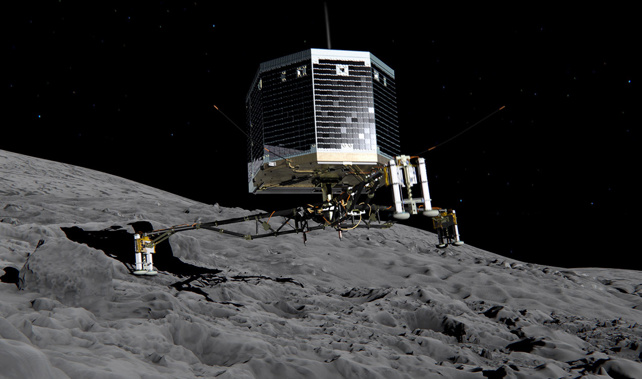
The European space probe Philae has woken up after nearly seven months in hibernation as it hurtles towards the Sun on the back of a comet.
The tiny robot lab may be ready to resume science work, excited mission officials said on Sunday.
"Hello Earth! Can you hear me?" the washing machine-sized lander tweeted under the hashtag #WakeUpPhilae.
"We got a two-minute... successful communication" at 2228 Central European Time on Saturday, mission manager Patrick Martin said from the operations centre in Madrid.
"This was sufficient to confirm that Philae is healthy and that its sub-systems are OK in terms of energy and temperature for ongoing communication with Rosetta," he said, referring to the lander's mothership orbiting Comet 67P/Churyumov-Gerasimenko.
The mission seeks to unlock the long-held secrets of comets - primordial clusters of ice and dust that scientists believe may reveal how the solar system was formed.
The 100-kilogram robot lab touched down on "67P" on November 12 after an epic 10-year trek piggy-backing on Rosetta.
But instead of harpooning itself onto the dusty ice ball's surface, Philae bounced several times before settling at an angle in a dark ditch.
It had enough stored battery power for about 60 hours of experiments, enabling it to send home reams of data before going into standby mode on November 15.
As "67P" drew closer to the Sun, scientists hoped better light would recharge Philae's batteries enough for it to reboot, then make contact, and ultimately carry out a new series of experiments.
After two failed bids to make contact in March and April, a new attempt was launched in May.
"We were surprised, yes, because we didn't expect it at all last night, on a weekend - it's really exciting," Martin said.
An ESA statement said Philae communicated with its ground team for 85 seconds, and preliminary analysis of the data showed it must also have been awake earlier but unable to make contact.
The comet and its precious cargo are 305 million kilometres from Earth, racing at a speed of 31.24km a second, according to ESA's website.
By August 13 the comet will reach its closest point to the Sun before veering off again into the deeper reaches of space.
There are still more than 8000 data packets in Philae's mass memory to be analysed, according to ESA.
Take your Radio, Podcasts and Music with you









